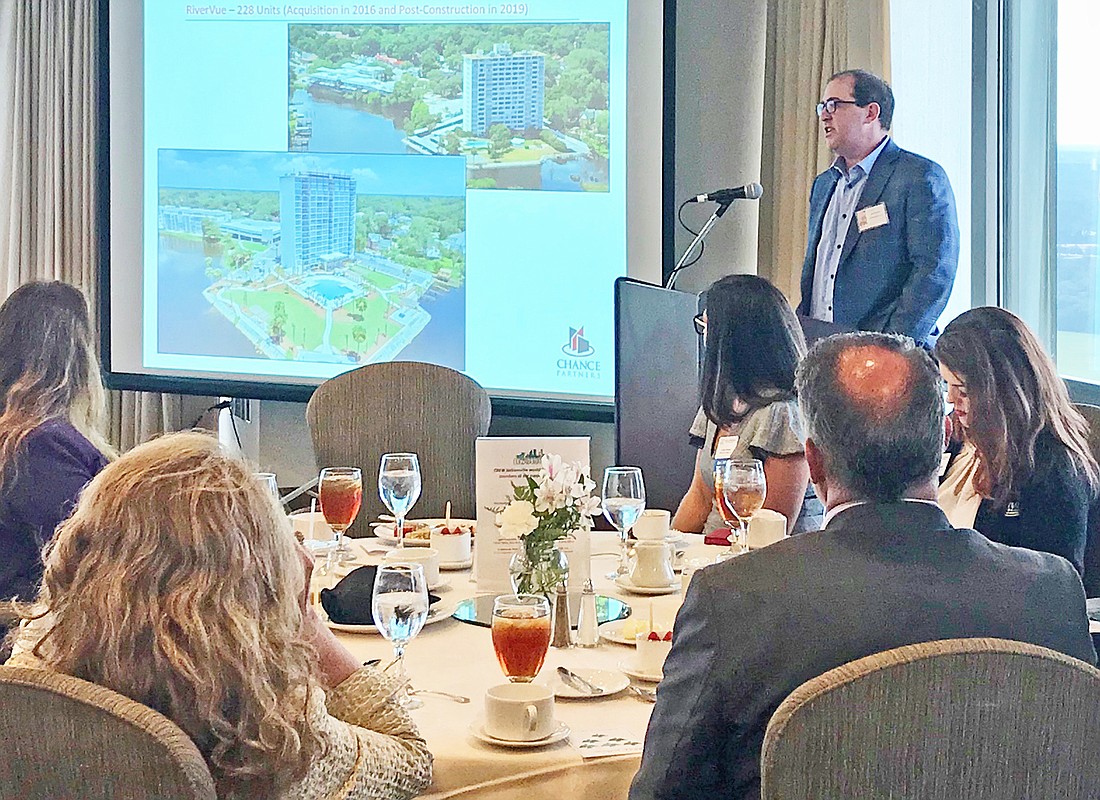
For developers willing to invest patient capital into projects in census tracts seeking redevelopment, an Opportunity Zone might be the right option, said Chance Partners LLC Principal Jeff Rosen.
Opportunity Zones, created as part of the federal Tax Cuts and Jobs Act of 2017, offer tax breaks designed to spur economic development in economically distressed areas.
For investors to gain the maximum tax break of 15%, the investment must be held for seven years and be completed by 2026.
If the investment is held for five years, the tax break is 10%.
Rosen spoke at a Sept. 10 CREW Jacksonville meeting about the process, benefits and challenges of developing in an Opportunity Zone.
Chance Partners’ San Marco Crossing multifamily apartment project is in an Opportunity Zone.
Chance Partners demolished the former Southside Assembly of God building and will break ground on the project Sept. 26. The site is along Kings Avenue between Olevia Street and Mitchell Avenue, east of San Marco.
The project was funded with a combination of private investors who were familiar with Rosen and Chance Partners, as well as EJF Capital, an Arlington, Virginia-based institutional fund manager, which has a branch dedicated to Opportunity Zone funding.
“We got in front of a deal that made a lot of sense,” Rosen said. “It was already entitled. The economics were really good. It was in a transitional neighborhood, but it also made a lot of sense for what’s happening in the Southbank in San Marco.”
To invest in a property within an Opportunity Zone, investors must first set up a Qualified Opportunity Fund. Taxes on those funds can be deferred until 2026 or when the funds are used for development, whichever comes first.
The law states there must be at least one Opportunity Zone in every county in the state. Opportunity Zones are selected through an analysis of wealth, unemployment and population along with input from local entities.
There are 21 census tracts in Duval County designated as Opportunity Zones. They include Northwest Jacksonville, parts of the urban core, the Eastside, Cathedral District, Sports and Entertainment District, Arlington and Mayport.
Some cities, like Tampa, align incentives with Opportunity Zones to further entice developers to invest in the zones, Rosen said.
“There are certain cities that say if you’re an Opportunity Zone, we’re going to give revenue grants, we’re going to provide additional funding for projects,” Rosen said. “Jacksonville to date has not done anything specific to Opportunity Zones from a city or other investment perspective.”
Opportunity Zones also were discussed at a JAXUSA Opportunity Zones conference Aug. 22. More than 100 business executives and developers gathered to learn about the program.
It’s also possible to invest in a business that’s within an Opportunity Zone, but it must fall into certain categories, said Tucker Thoni, associate tax attorney at the GrayRobinson law firm. All of the company’s business must take place within that zone.
There also are restrictions on the types of business that can receive benefits. For example, golf courses, country clubs, massage parlors and casinos don’t qualify.
Investors also must double the value that they paid for the property within 30 months, but that only applies to an existing building, not a land purchase.
Madison Street Strategies founding partner Grey Dodge’s advice for local governments looking to take advantage of the Opportunity Zones is to start working immediately.
For example, Erie, Pennsylvania, marketed itself as “Pennsylvania’s Flagship Opportunity Zone” after the program began. According to its website, there is more than $750 million in ongoing private, public and philanthropic investment in the city.
Jacksonville is creating a prospectus to do the same, said JAXUSA Partnership President Aundra Wallace. It is expected to be released in the coming weeks. The prospectus is a compilation of demographic information and development opportunities within each of Jacksonville’s 21 Opportunity Zones.
Dana Tsakanikas, executive vice president and chief investment officer of Atlanta-based Hospitality Ventures Management Group, said investing in an Opportunity Zone may not be right for every company.
“It’s hard for a hotel to go into a low-income area,” he said. “New construction is expensive. I can’t make it work with a $59 rate.”
There is an altruistic aspect to investing in an Opportunity Zone since ultimately, it helps lift low-income neighborhoods, said Mari Kuraishi, president of the Jessie Ball duPont Fund foundation that makes grants.
“I think we’re all here because we want to see growth in Jacksonville,” she said. “I’m here because I want to see that growth be as inclusive as possible.”